A family of farmers have converted their land into a cemetery in a highly creative method of making cash.
The owners of Castle View Farm in Bottesford, Leicestershire have transformed what was once an ‘unproductive’ 10-acre spring barley field into a new and innovative source of income.
The 136-hectare family farm is run by husband and wife James and Claire Goodson and comprises of livery stables, a lake for fishing, alongside solar panels.
Speaking about the challenges farmers face in generating unique sources of income, Ms Goodson, 54, told The Telegraph that many had been forced to ‘diversify’ as a result of Rachel Reeves‘ inheritance tax raid.
The new policy outlined in the October budget means farmers are set to pay inheritance tax on agricultural property and land worth more than £1million at a rate of 20 per cent – half the main base rate – from April 2026.
With campaigners warning that the decision will likely affect almost all family farms, many looked towards alternative sources of income, such as selling produce or letting out space.
But, Ms Goodson, who described the farming industry as ‘really tough’, has outlined her family’s innovative use of their historical land in the hopes that it may inspire and encourage others.
Set against the picturesque backdrop of Vale of Belvoir, Belvoir Castle and Lincoln, their once abandoned field is now capable of holding up to 7,500 burial plots at a cost of either £500 for an ashes plot of £1,400 for a full burial.
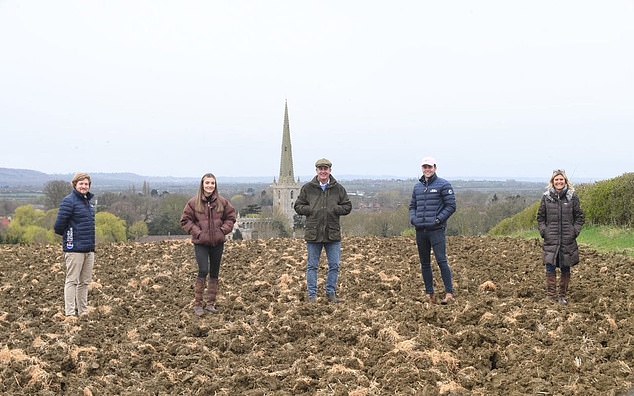
The owners of family-run Castle View Farm in Bottesford, Leicestershire (pictured) have transformed what was once an ‘unproductive’ 10-acre spring barley field into a cemetery that can hold up to 7,500 burial plots at a cost of either £500 for an ashes plot of £1,400 for a full burial
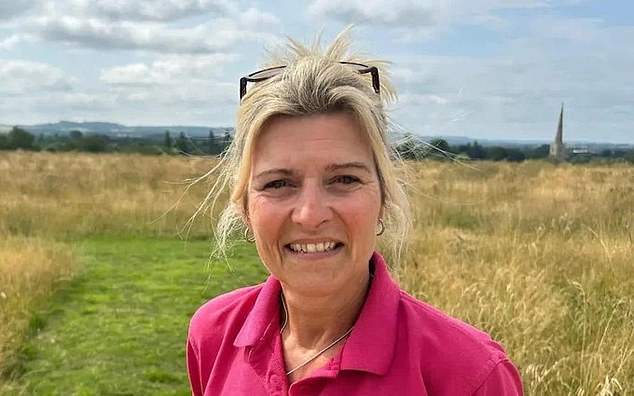
Speaking about the challenges farmers face in generating unique sources of income, Ms Goodson (pictured), 54,said that many had been forced to ‘diversify’ as a result of Rachel Reeves ‘ inheritance tax raid
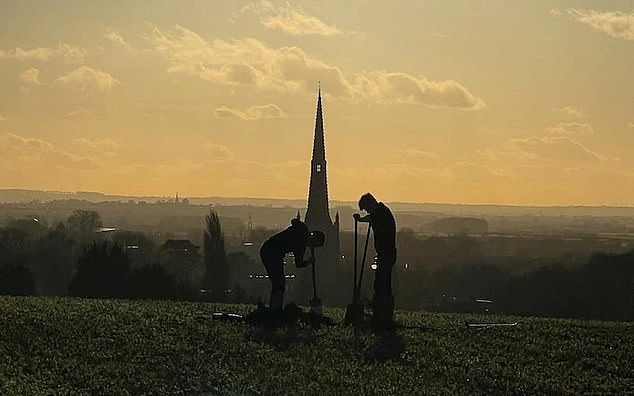
Set against the picturesque backdrop of Vale of Belvoir, Belvoir Castle and Lincoln, while traditional gravestones are not on offer, wooden plaques placed at ground level ensure that the area is marked. The family achieved planning permission for the cemetery in 2021
While traditional gravestones are not on offer, wooden plaques placed at ground level ensure that the area is marked.
The unique idea first came from their daughter Emily, a university student then aged 21, after the field’s heavy clay meant it was no longer suitable for growing crops.
After obtaining planning permission in 2021, the family set up their modern burial ground three years ago, prior to Chancellor Reeves’ Autumn Budget.
But for Ms Goodson, the timing is absolutely perfect – with the ‘lovely’ field now offering ‘an easier way of bringing income’ for their farming family while also providing ‘wonderful views’ for people to remember their loved ones.
The couple, who also have a son James, are hopeful that the burial site will be used for generations of families in their community to come.
Speaking to the BBC, Ms Goodson added: ‘No-one wants to talk about death but I feel like more people are now.
‘I find that this is a nicer alternative than maybe the churchyard or crematorium because they know they can come and visit a nice place.’
With up to 50 plots set to be laid, several locals, despite being initially sceptical, have now praised the idea and even expressed a desire to get buried there themselves.
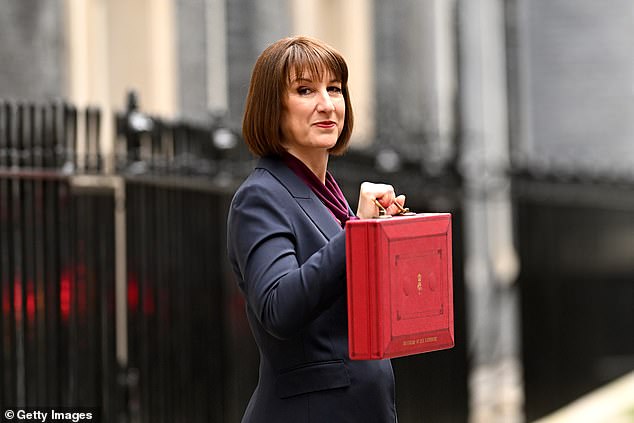
In June, it was reported by The Telegraph that more than 40 Labour MPs are said to be considering a bid to water down looming changes to agricultural and business inheritance tax relief introduced by Chancellor Rachel Reeves (pictured) in the October budget
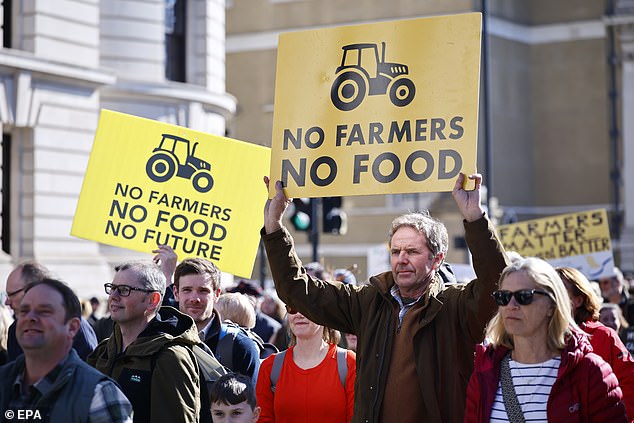
The National Farmers’ Union (NFU) and others say the impact of Ms Reeves’ measures will be much more widespread. Critics claim the move could wipe out family-run farms with tight margins, as they will be forced to sell up in order to pay death duties
Alongside providing a burial ground, the family also contribute to local wildlife and biodiversity, planting up top 93 trees that they eventually hope will comprise of bat boxes and owl boxes.
They currently house hedgehog boxes, alongside a family of nine hares.
In June, it was reported by The Telegraph that more than 40 Labour MPs are said to be considering a bid to water down looming changes to agricultural and business inheritance tax relief.
The Government have previously insisted the measures – dubbed the ‘family farm tax’ and set to be in place from April 2026 – will only affect the wealthiest quarter of landowners.
But the National Farmers’ Union (NFU) and others say the impact of Ms Reeves’ measures will be much more widespread.
Critics claim the move could wipe out family-run farms with tight margins, as they will be forced to sell up in order to pay death duties.
There have been months of demonstrations by farmers in response to the Chancellor’s tax raid, including tractor protests in Wesminster.

The Government have previously insisted the measures – dubbed the ‘family farm tax’ and set to be in place from April 2026 – will only affect the wealthiest quarter of landowners
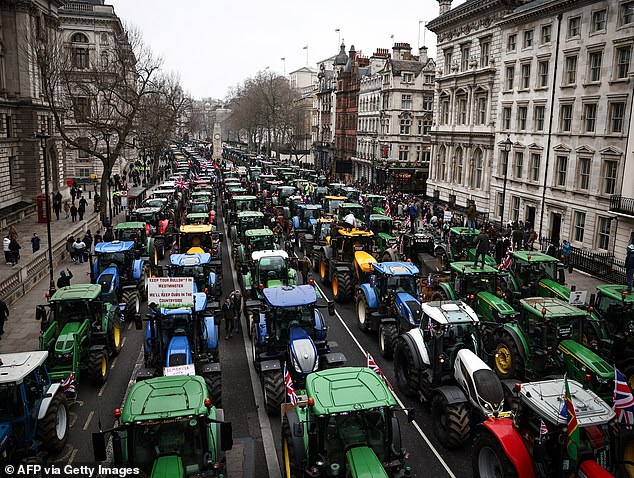
There have been months of demonstrations by farmers in response to the Chancellor’s tax raid, including tractor protests in Wesminster
A ‘rural growth group’ of Labour MPs is now proposing the raising of the £1million cut-off point at which estates lose their tax reliefs.
They have suggested estates receive full tax relief on the value of agricultural properties up to £10million, 50 per cent to £20million, and nil thereafter.
Sam Rushworth, Labour MP for Bishop Auckland, who is a member of the group, told the newspaper they would ‘consider what amendments to put down’.
Mr Rushworth said: ‘We are all keen to avoid amendments. I don’t want it to get to that point. I am a Labour MP and I broadly support the Government.
‘I would like to see them bring forward different recommendations in the Bill.’












